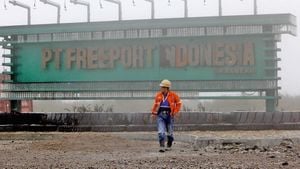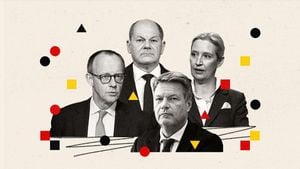The German Social Democratic Party (SPD) has faced the harsh reality of a historic electoral defeat, recording only 16.4% of the votes during the recent 2025 Bundestag elections. This marks the lowest share for the party since 1890, leading to widespread calls for restructuring at all levels to revive its political standing.
Following the announcement of the results, which places the SPD significantly behind the CDU/CSU at 28.5% and the AFD at 20.5%, the mood was somber at the party headquarters. "Das ist eine Wahlniederlage," stated Chancellor Olaf Scholz, who acknowledged responsibility for the dismal outcome. It became evident during discussions among party leaders, particularly after they faced stony silence as the vote tally appeared, contrasting sharply with the previous election's enthusiasm when the SPD had secured over 25% of the votes.
Party co-chair Lars Klingbeil described the election result as "eine Zäsur," highlighting the need for an overhaul within the SPD to effectively reposition itself as the leading party of the center-left. Scholz's administration, having grappling with various crises, including the fallout from the Ukraine conflict and internal coalition strife with the FDP and Greens, may now be seen as short-lived, possibly categorizing Scholz as the “short-term chancellor”.
Saskia Esken, the other co-chair, also expressed sentiments of renewal but emphasized the importance of establishing changes collaboratively rather than reacting hastily on the night of results. She stated, "Wir müssen natürlich die SPD angesichts dieses enttäuschenden Ergebnisses auch neu aufstellen." The sense of urgency within the party reflects not just internal pressure but the pressing need to engage seriously with potential coalition partners moving forward.
Defense Minister Boris Pistorius's name continues to surface as many party members view him as the ideal candidate for the chancellor position going forward. Despite not being prominently featured during the campaign, Pistorius's leadership style and negotiating abilities have begun to garner respect among party insiders. He noted post-election, "Die Partei entscheidet, mit welcher Mannschaft wir in die nächsten Monate und Jahre gehen…" indicating his readiness to take charge of upcoming negotiations.
The fallout from this election has not just resulted in discussions around leadership but also questions about the SPD's identity and platform. Before the election, there were doubts about the party’s image, with concerns about whether they could effectively represent the working class and social policies key to their platform.
Scholz remains chancellor until the SPD can select his successor, and the transition appears to be complicated. Despite his intentions to serve till the end, many speculate about how long he can hang onto power with growing dissent bubbling within and the looming Berlin political dynamics. The pressure for immediate action is immense, as Europe expects Germany to present a united and effective front amid continued global tensions, particularly concerning support for Ukraine.
Overall, the SPD stands on the precipice of significant transformation as they assess their strategies and leadership, facing the very real prospect of becoming junior partners—if they decide to align with the CDU. The time for action is now, as past misconceptions and strategic failures must be recalibrated for future elections and coalition formations.
Reflecting internally, both Klingbeil and Esken acknowledge the need for recalibration and adaptation to rebuild the party's image. Esken remarked to the collective, "Du hast gekämpft wie ein Löwe," acknowledging Scholz’s struggles during the campaign but also implicitly noting the collective failures of the party as they navigate this murky political sea.
With the SPD now potentially heading for tough negotiations to lay the groundwork for their future, the immediate challenge remains one of survival and re-establishment as members are determined to reclaim their role as champions of the left.



